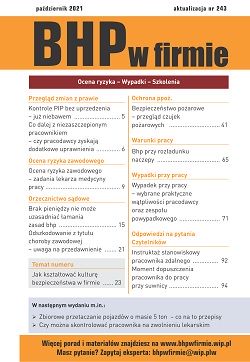
- Subject of the issue: How to shape the safety culture in the company
A very important part of company management is shaping the safety culture in the plant. The benefits of a high safety culture include: declining accident rates. What does this mean in practice? A high safety culture means fewer accidents, better work efficiency of employees, and all this means more income for the company. Do you want to raise the safety culture in your plant? In this article, we explain how to do it quickly and efficiently.
- What to do next with an unvaccinated employee - will employers gain additional rights
Will an unvaccinated employee be transferred to another position or be dismissed altogether? The government has announced the introduction of additional powers for employers hiring unvaccinated workers. Various solutions are analyzed - from the right to ask an employee for vaccination, through the transfer of the unvaccinated to another job, and even the possibility of dismissal of unvaccinated people. Why is the government considering the introduction of new powers for employers?
- Occupational risk assessment - tasks of an occupational medicine physician
The role of every employer is to carry out an occupational risk assessment. Occupational risk should be assessed primarily when selecting the equipment of workstations and workplaces, chemical, biological, carcinogenic or mutagenic substances and preparations used, and changing the organization of work. During the occupational risk assessment, all factors of the working environment occurring during the work performed and the methods of performing the work are taken into account . It should be remembered that the doctor who provides preventive health care for employees should participate in the processes of recognizing and assessing occupational risk also during the COVID-19 epidemic. Check what belongs to the statutory duties of a doctor.
- Lack of money cannot justify violation of health and safety rules
Employers are obliged to ensure safe and hygienic working conditions for their employees. Large costs or lack of money cannot excuse failure to fulfill one's obligations. As stated by the provincial administrative court, the financial aspect cannot be taken into account when it comes to the implementation of the basic requirements of providing employees with basic hygienic conditions, also serving to protect their health. Find out the details of the rationale behind such a decision.
- Occupational Disease Compensation - Consideration of the statute of limitations
What is the period within which an employee can claim compensation for an occupational disease? Will it be taken into account in each case of the defendant's employer bringing an objection that the claim asserted by an employee is statute-barred in a lawsuit? Check what the practice of the courts shows.
- Fire safety - inspection of fire detectors
Why is fire protection so important? Fire is an element that, due to the speed of spreading and the difficulty of mastering it, can burn the entire building down in a very short time. It poses a great danger to the health and life of people within its range. In order to limit the effects of a fire, it should be detected as soon as possible - only then is it the best chance of extinguishing it. Fire detectors are indispensable tools for this. In this article, we provide an overview of such detectors and their purpose. We also advise where they can be installed and describe the rules for avoiding false alarms. This is knowledge that will help increase fire safety in your company.
- Health and safety when unloading a trailer
The regulations do not prohibit unloading a detached trailer, but the conditions must always be taken into account. The driver is responsible for setting up and preparing the trailer, and the recipient is responsible for damage during unloading. The driver's obligations during unloading should be specified in the contract or order for transport. What else should you remember?
- Accident at work - selected practical doubts of the employer and the accident team
Every accident at work is an accident - but not every accident is an accident at work. The correct legal qualification of the event is not the only dilemma that may be encountered by the employer and the accident team in connection with the accident. The regulations, although well-established for many years, do not resolve many practical doubts influencing the correctness of the conducted proceedings - the more so as the issue of accidents at work is one of the favorite control issues of labor inspectors.
- The moment of admitting an employee to work on an overhead crane
When can an employee be allowed to operate a crane in the plant - or immediately after passing the exam at the Office of Technical Inspection and conducting on-the-job training? However, should you wait for the delivery of the document confirming obtaining the authorization by the Office of Technical Inspection?
- On-the-job training of a remote employee
How to organize on-the-job training for employees who work remotely from the beginning of their employment? I mean the administrative and office position in the IT department. Will sending employees an occupational risk assessment in remote work and instructions on the organization of the workplace and the rules of its performance be sufficient until the employee switches to the stationary work system? Can the on-the-job training on the Initial Training Card be carried out/entered with the date of commencement of work, but only in the system of stationary work?
- National Labor Inspectorate's inspections without notice - soon
So far, the question of whether the National Labor Inspectorate should notify a given employer about an inspection or not has been debatable. The draft act amending the act - Entrepreneurs' Law is ultimately intended to allow for an inspection to be carried out without notice.
BHP w firmie (Work safety in the company) - the whole list







